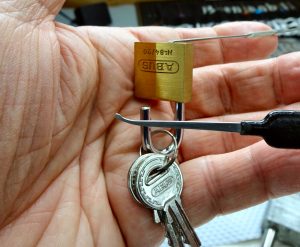
The keyways you’ve been working in so far have been pretty wide open, and we did that on purpose so you could develop your techniques without parts of the lock getting in the way. When your pick rubs against the sides of the keyway, the feedback is dampened significantly, making it harder to figure out what the lock is doing.
You can be sure that the lock designers know this, and many of them produce very small keyways to defeat us. In many cases you’ll find that even your smallest pick barely fits into the keyway, requiring you to get a bit….creative. You will either need to use a small top of the keyway (TOK) tension tool that you custom make, or slim down your short hook so it’ll fit.
You’ll often find tiny locks on luggage, backpacks, jewelry boxes, gym lockers, and candy machines. While they provide minimal security it’s sometimes impossible to break them off without damaging whatever they’re attached to, so picking is the only way to open them. A few of the most common locks are in the picture, from left to right: Master, Generic “Tuff Stuff”, Guard Security, Master #7, and Abus 72/40. The Abus is actually a wonderful lock with a small, heavily warded keyway and a 6-pin core full of spools. If you live in Europe you’ll find this little lock everywhere, and it is not easy to pick unless you’re proficient in spool picking. I’ve found that a short hook with a thinned down shaft fits into the tiny keyways almost perfectly and I use a small, home made TOK tensioner made from a windshield wiper insert.
Most locks that have these tiny keyways only contain standard pins but they can be difficult to open. One of the hardest locks I ever had to pick was a small 3-pin Zeiss telephone lock. I ultimately had to use 600 grit sandpaper to thin down one of my hooks to about a third of it’s original height. Only then could I squeeze it into the keyway to access those tiny pins. Thank goodness they weren’t security pins! If they were, I’d STILL be there struggling with it.

You may ask if time spent on these locks is a waste of time. I’ll leave that up to you. My job is to make sure you are a well-rounded lock picker, capable of picking any lock you might encounter. Small locks and constricted keyways are a fact of life. You WILL encounter them sooner or later, so I’d recommend you spend a few days building up your experience on them.
Better to have a skill and not need it, than to need it and not have it.
Let’s continue broadening your skill foundation in LP303!